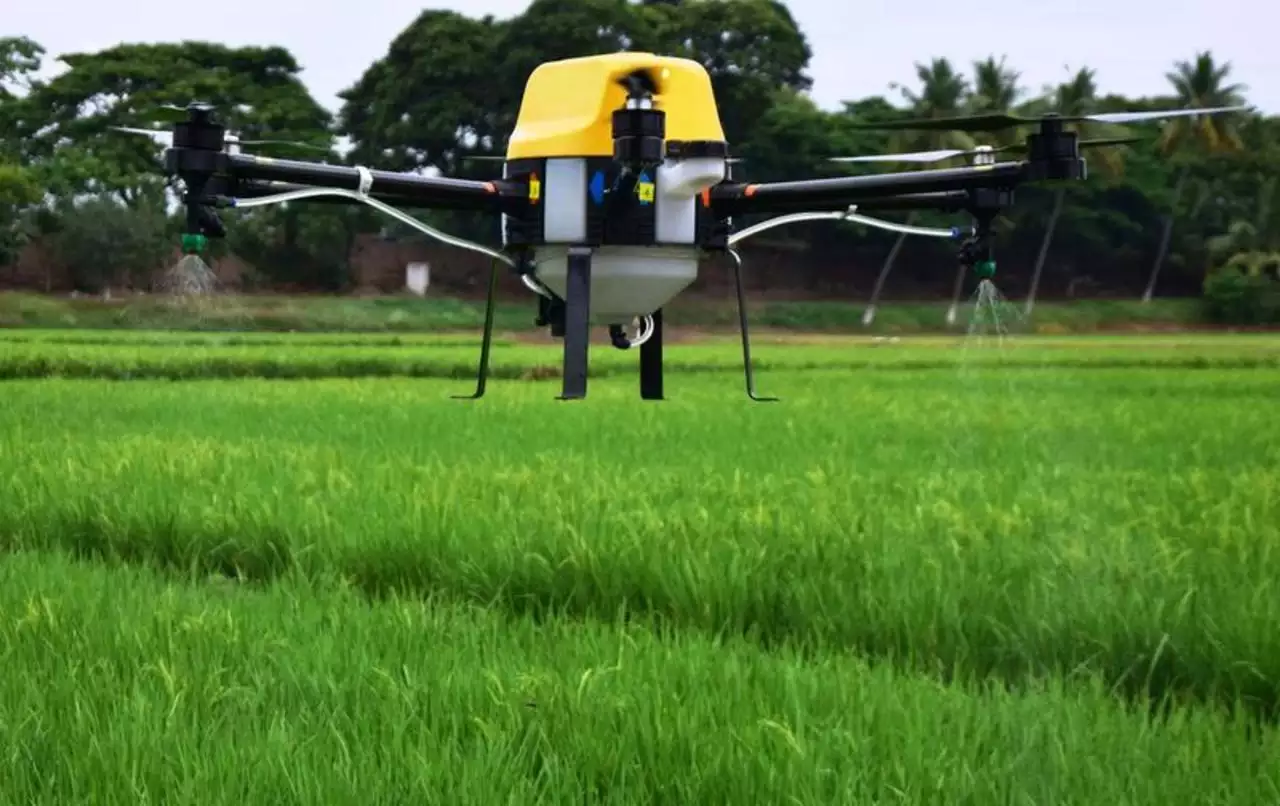
In recent years, the agriculture industry has witnessed a revolution in farming practices with the introduction of drone sprayers. These advanced aerial devices have emerged as a game-changer, offering efficient and precise crop spraying capabilities. The crops like sugarcane, Pomegranate or high in heights where normal sprayers can’t reach, where the Drone Sprayers are useful.
Understanding Drone Sprayers:
Drone sprayers, also known as agricultural drones, are unmanned aerial vehicles (UAVs) specifically designed for crop spraying. Equipped with state-of-the-art technology, these drones provide farmers with a more effective and sustainable method of applying pesticides, fertilizers, and other treatments to their fields.
Advantages of Ag Drones for Spraying:
2.1 Increased Efficiency: Drone sprayers offer swift and precise spraying, significantly reducing the time and effort required for crop treatment. They can cover large areas quickly, ensuring timely application of treatments.
2.2 Enhanced Precision: With advanced sensors and GPS capabilities, drone sprayers can precisely target specific areas, minimizing wastage of resources and reducing environmental impact.
2.3 Safety for Farmers: By eliminating the need for manual spraying, drone sprayers protect farmers from potential exposure to harmful chemicals, enhancing their safety in the field.
2.4 Cost-effectiveness: Despite their initial investment, drone sprayers can lead to long-term cost savings due to reduced labor and chemical usage.
Applications of Drone Sprayers:
3.1 Pest and Disease Control: Drone sprayers excel in delivering targeted treatments for pest control, disease prevention, and weed management, safeguarding crop health.
3.2 Crop Nutrient Management: Drones can efficiently distribute fertilizers and nutrients, ensuring balanced nutrition for plants, and promoting optimal growth.
3.3 Precision Agriculture: By collecting aerial data, drone sprayers contribute to precision agriculture, facilitating crop monitoring, yield prediction, and crop mapping.
Factors Influencing Drone Sprayer Prices:
4.1 Drone Specifications: Different models offer varying payload capacities, flight times, and spraying capabilities, affecting their prices accordingly.
4.2 Sensor Technology: Advanced sensors, such as multispectral or hyperspectral cameras, can enhance the drone’s data collection capabilities, but they may contribute to higher costs.
4.3 Software Integration: Drones equipped with sophisticated software for flight planning, data analysis, and mapping may be priced higher due to the added value they bring to farmers.
4.4 Brand and Reputation: Established brands with a track record of quality and reliability might have higher-priced drone sprayers compared to newer or lesser-known manufacturers.
4.5 After-sales Support: Factors like warranty, customer service, and availability of spare parts can influence the overall price and value proposition of a drone sprayer.
Drone sprayer prices
can vary depending on several factors, including the brand, specifications, features, and additional accessories. Generally, drone sprayers designed for agricultural use tend to be more expensive compared to consumer-grade drones due to their specialized capabilities and robust build.
The price range for drone sprayers can vary significantly, but as of my knowledge cutoff in September 2021, you can expect to find agricultural drone sprayers priced anywhere from $2,000 to $30,000 or more. It’s important to note that this range is an estimate and prices may have changed since then.
Lower-priced drone sprayers typically offer basic functionalities, limited flight time, and smaller payload capacities. They may be suitable for smaller farms or specific applications. As you move up the price range, you’ll find more advanced features such as longer flight times, higher payload capacities, integrated GPS systems, advanced sensors, and specialized software for flight planning and data analysis.
Additionally, the reputation and brand of the drone manufacturer can also impact the pricing. Well-established brands that have a proven track record of quality and reliability may have higher-priced drone sprayers compared to newer or lesser-known manufacturers.
Conclusion:
As technology continues to advance, the capabilities of drone sprayers will likely evolve, offering even more innovative features to improve agricultural practices and shape the future of farming.









